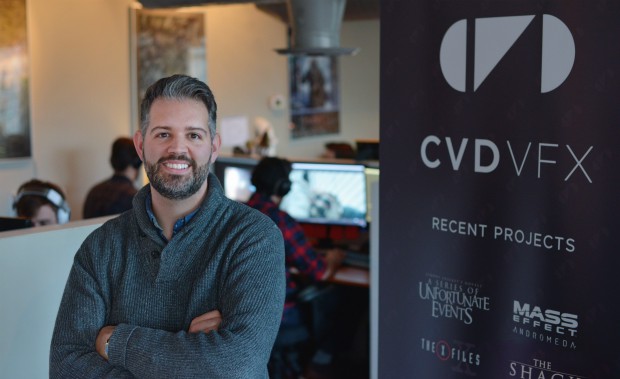Chris Van Dyck: Mentoring the next generation of filmmakers
As Vancouver's film industry grows, so does the city's reputation for producing outstanding digital visual effects.

With more than 60 VFX and animation studios, Vancouver makes up the world's largest cluster of studios, owned by both foreign and domestic companies.
Earlier this year, Chris Van Dyck, the owner of CVD VFX which will be moving to the North Shore this fall, had a tour of Capilano University's state-of-the-art Bosa Centre for Film and Animation, and generously established the annual CVD VFX Scholarship. The $2,000 scholarship will be available to students in the Digital Visual Effects program at Capilano University.
An accomplished visual effects artist, Van Dyck has worked on both the Harry Potter and The Hobbit series, as well as Warcraft, Tron, Pirates of the Caribbean and the recently released Netflix series, A Series of Unfortunate Events.
“I wanted to establish roots to the North Shore, and at the same time connect with the local student talent at an advisory level,” Van Dyck explains. “I hope this fund will help students know that companies are interested, and watching their progress. Opportunities are out there.”
Van Dyck’s connection to Capilano University extends beyond a business interest. His wife Brittany attended CapU, and he has hired a number of graduates from the Digital Visual Effects and 3D Animation for Film and Games programs.
“I’m really excited to have Mike Accettura, Lauren Aspden and Tarina Averill on our team,” says Van Dyck. “I like hiring Cap students. I find that they to come into the job post-graduation with a well-rounded education and readiness for the industry.”
Van Dyck’s interest in VFX began as a high school student in Vancouver. Coming into his senior year, he began to recognize his creative strengths and see a future in special effects.
“I was really drawn to visual effects in Grade 12, and had a lot of great support from my parents and teachers. Peer to peer networking, and my first few bosses continued to push me and give me direction,” he says. “In this industry, the reward for good work is more work. Working those 80-100 hour weeks in the early stages of my career laid a good foundation for work ethic, and I was fortunate to find success as a freelance artist who could chase one project after another.”
His advice to students? “It can get really competitive so try to find your specialty and let the work speak for itself.”
Submitted by: Communications & Marketing
